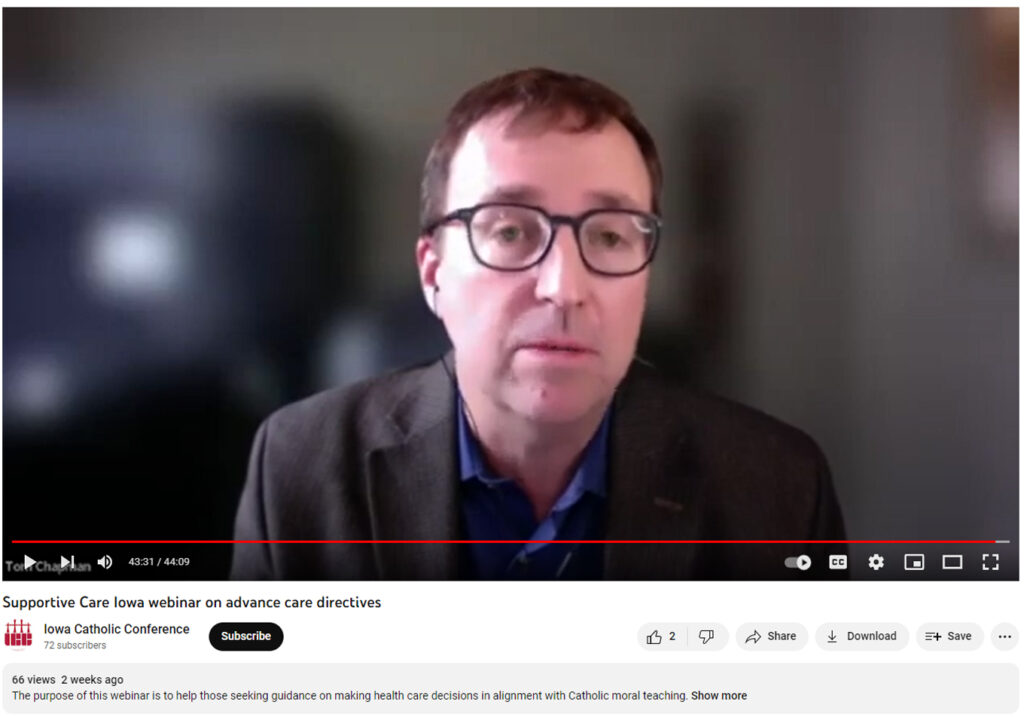
Tom Chapman, executive director of Iowa Catholic Conference, speaks during a webinar on advanced care directives.
By Lindsay Steele
The Catholic Messenger
Catholic teaching requires respect for life from womb to tomb but many Catholics are unsure how to apply this belief to end-of-life issues, such as whether to undertake medical treatments.
Deacon Dan Freeman has observed this quandary while assisting people in the Diocese of Davenport with advance care directives. “A person who is struggling and suffering still has value,” he said. “There’s a lot of confusion on the other end of life, a lot of things people don’t understand.”
He recently shared his thoughts and experiences in an Iowa Catholic Conference (ICC) webinar on advance care directives, now available on YouTube at https://www.youtube.com/
watch?v=W-2XttBbDlg. The webinar includes an explanation of the Church’s perspective on using or forgoing life-sustaining treatments as well as information about palliative care.
Janine Idziak, chancellor and consultant for Health Care Ethics for the Archdiocese of Dubuque, said these guidelines aim to help people as they make difficult decisions about using or forgoing treatments. Morally, one ought to undertake medical treatment that offers a reasonable hope of benefit without excessive burden, she explained. Conversely, if realistic hope of benefit to the patient does not exist or the burdens of treatment outweigh its benefits, it is morally permissible to forgo life-sustaining treatment. The benefits and burdens principle should be applied on a case-by-case basis. Treatment may be undertaken before determining whether to continue, she said.
Idziak also discussed the ethics of palliative care, which focuses on the management of pain and distressing symptoms. In the past, Christians thought they were expected to “tough it out and offer it up,” but that is no longer the case. She quoted the U.S. Conference of Catholic Bishops’ document, “Ethical and Religious Directives for Catholic Health Care Services,” which states that effective management of pain in all of its forms is critical in the appropriate care of the dying.
Deacon Freeman, parish life coordinator for St. Mary Parish in Wilton, offered an overview of documents that allow individuals to ensure that their preferences are respected by family members and medical professionals. He received training on advance care directives about five years ago.
The ICC does not recommend Iowa’s Standard Living Will document due to its divergence from Church teaching on some issues, he said. Instead, he suggests people complete a Durable Power of Attorney for Health Care form and, if appropriate, an Iowa Physician Orders for Scope of Treatment (IPOST). These can be “renewed and reviewed” as circumstances change.
Deacon Kent Ferris, the Diocese of Davenport’s Social Action director, shared his perspective on the importance of completing the documents. Though he had training in advance care directives, he did not complete his paperwork until after he suffered a mild heart attack last year. “The experience served as a wake-up call,” said Ferris, 57. He now has a Durable Power of Attorney for Health Care. “Now our family knows of the steps we’ve taken to be prepared.”
To obtain the documents or for more information, go to www.iowacatholicconference.org or contact director Tom Chapman at tom@iowacatholic
conference.org. “We really encourage you, if you don’t have (documents) to start working on them. Don’t hesitate to reach out to us,” Chapman said.











